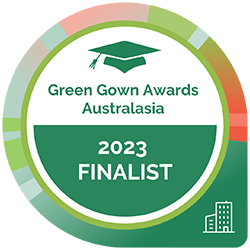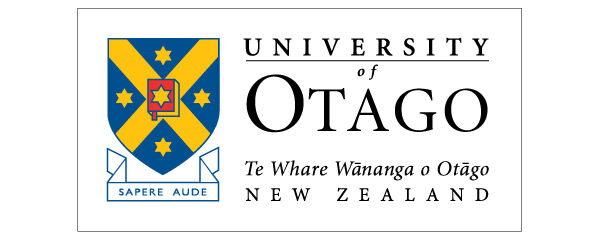Climate Action category
The University of Otago is committed to living up to its role as a critic and conscience of society by both addressing its own carbon footprint and working with others to support the transition to low emissions economies that are sustainable for the planet and its communities. This work is being driven through our University’s Net Carbon Zero Programme, which was established following a commitment in 2019 to reach net zero greenhouse gas emissions by 2030.
A dedicated programme manager began in early 2021 and by the end of that year, the first iteration of a programme business case had been endorsed by senior leadership and the University of Otago Council. The business case sets out the target operating model in 2030, emissions reduction targets for every emissions source annually through to 2032, and a staged approach to meet these targets. The overarching goal is for total emissions to reduce by 54% from 2019 to 2029, with 2029’s emissions offset in 2030 to achieve net zero.
In early 2022, the University publicly released our ‘Journey to 2030′, a document which set out the University’s past, present and intended future with respect to emissions. Rather than employ the standard metaphor of a ‘roadmap’, we drew inspiration from Polynesian explorers and contemporary indigenous academics’ focus on the wayfinding method of leadership and are employing a wayfinding approach (Spiller, Barclay-Kerr, & Panoho, 2015). This acknowledges that, while reaching net zero is our primary goal, we cannot predict with certainty what the future may look like, or what challenges we will face along the way, and we must not lose sight of the many purposes of this voyage. The steps we have taken to date have established the foundation to pursue net zero in a fashion befitting a research-led university in Aotearoa New Zealand.
The principles for our pursuit of net zero emerged from work to refresh the University’s Sustainability Strategic Framework (see: Tī Kouka: Sustainability Strategic Framework 2022-2030). Our net zero principles centre on orangatanga (the health and wellbeing of ecosystems and society) as this is where corrective action is required. How and what we’ll do is guided by the principles of kaitiakitanga (reciprocal stewardship), manaakitanga (looking after and giving back), whanaungatanga (participation, belonging and connection) and kotahitanga (cohesion and collaboration). Around all of this we wrap mātauranga (creation and sharing of knowledge and understanding), which acknowledges the unique position of a university to positively influence activities beyond its operational boundaries.
A key tenet of the programme is that emissions reductions reach across all aspects of our University operations, all staff will have roles to play, and many projects that reduce emissions will be funded from existing baselines, such as efforts to reduce building footprints and save energy. However, in some instances, departmental budgets may prove insufficient to purchase the lower emissions option, such as for replacement vehicles. For this reason, a separate $5.5m decarbonisation fund was established within the University’s long-term capital plan. To date, this fund, which is administered by the Net Carbon Zero Programme, has helped ensure the purchase of low emissions vehicles for Trades Services and Schools Liaison teams, energy-efficient freezers for Microbiology, and brought forward replacing fossil fuel boilers. Funding top-ups are followed by work to review standards and purchasing approaches, so the low emissions option becomes the default, bulk purchasing options are explored, and financial budgets are set accordingly (so top-ups are no longer required).
Having agreed emissions targets in place and our ‘Journey to 2030’ published by early 2022 enabled our University to bank some of the emissions reductions realised as a result of COVID-19. Pre-pandemic, business air travel was our largest emissions source (c.12,000tCO2-e). This reduced by 86% with the advent of pandemic-related travel restrictions. Our target for 2022 and beyond was that these emissions would not go back above 5,500tCO2-e (46% of 2019). This means that as we emerged from travel restrictions we could communicate to staff what the new normal needs to look like, and update policies that stood in the way of more online attendance or trip-stacking to reduce total flights. Business air travel emissions in 2022 were 4,300tCO2-e, well below the new ceiling and we forecast staying below this ceiling in 2023 with no external, nationwide travel restrictions. Our current focus is on supporting heads of department with better reporting to manage for emissions as well as financial cost, and to ensure equity and high impact through the distribution of travel.
The programme principles described above are reflected in our embrace of the living lab approach. Wherever possible, we try to connect teaching, research and external/community partnerships to solve operational issues and reduce our net emissions. Examples of net zero-related living lab projects include:
- Collaborations with the Otago Energy Research Centre and the Physics Department to support student projects investigating options to replace LPG boilers, increase energy efficiency at University-owned flats and right-size solar and battery storage installs for resilience, load-shedding, and decarbonisation outcomes
- End-of-trip living lab, which is testing the use of an app for carpark management, improved EV charging facilities and e-bike storage, and an end-of-trip neighbourhood model, while working with staff and students in disciplines such as Surveying to assess the outcomes – with a view to applying lessons learnt to support low emissions commuting to and from all of our campuses
- Native forest regeneration summer scholarship projects undertaken by nine botany students over the last two years looking at soil carbon, viability of drone seeding, and mapping and age assessments of naturally regenerating vegetation to inform potential University carbon ‘insetting’ projects.
Connecting our mahi (work) with our partners is also an important part of enacting our principles. We work closely with the Otago University Students Association on initiatives such as Drop For Good (reducing waste generated by the student community) and, based on feedback from students, we are collaborating on a project that hopes to reintroduce passenger rail between Christchurch and Dunedin to provide more sustainable travel options for students at peak travel times in the year.
We are also a foundational member of the Dunedin Zero Carbon Alliance – New Zealand’s first city-based Zero Carbon Alliance – alongside the Dunedin City Council and Otago Regional Council, Te Whatu Ora Southern (district health board) and Otago Polytechnic. As major employers in Dunedin with specialist knowledge, we have a key role to play in helping the city achieve its net zero 2030 target. Three members of the alliance (us, the Dunedin City Council, and Te Whatu Ora) co-fund a workplace travel plan coordinator who works across the three organisations to promote active and public transport to reduce commuting emissions, alongside other objectives such as enhancing and supporting the wellbeing of our people (see the University’s Workplace Travel Plan for more details).
Our University is also an active participant in the Carbon Neutral Government Programme (CNGP) and has presented at online seminars on topics such as emissions reduction planning and workplace travel planning. Through the CNGP network, we have connected with organisations such as Corrections (sharing lessons from calculating food emissions), Inland Revenue (employee travel surveys and connecting Dunedin office staff to Zero Carbon Alliance mahi) and Crown Research Institutes (lab-based emission reduction). The University also engages with its partners in the Matariki Network of universities globally, co-organising the first online ‘climate hui’ held in April 2023.
Finally, our University is not only focused on climate change mitigation but acknowledges that climate change adaptation is also needed. Though the University is not currently required to report on climate-related risk, we did an assessment in 2022 and an interim report on financial risks out to the year 2100 (encompassing physical and transitionary risks) has been provided to the University of Otago Council in 2023. These are the first steps towards fully understanding, disclosing and planning for climate-related risks across all our operations.
Spiller, C., Barclay-Kerr, H., & Panoho, J. (2015). Wayfinding leadership : ground-breaking wisdom for developing leaders. Wellington Aotearoa New Zealand: Huia.
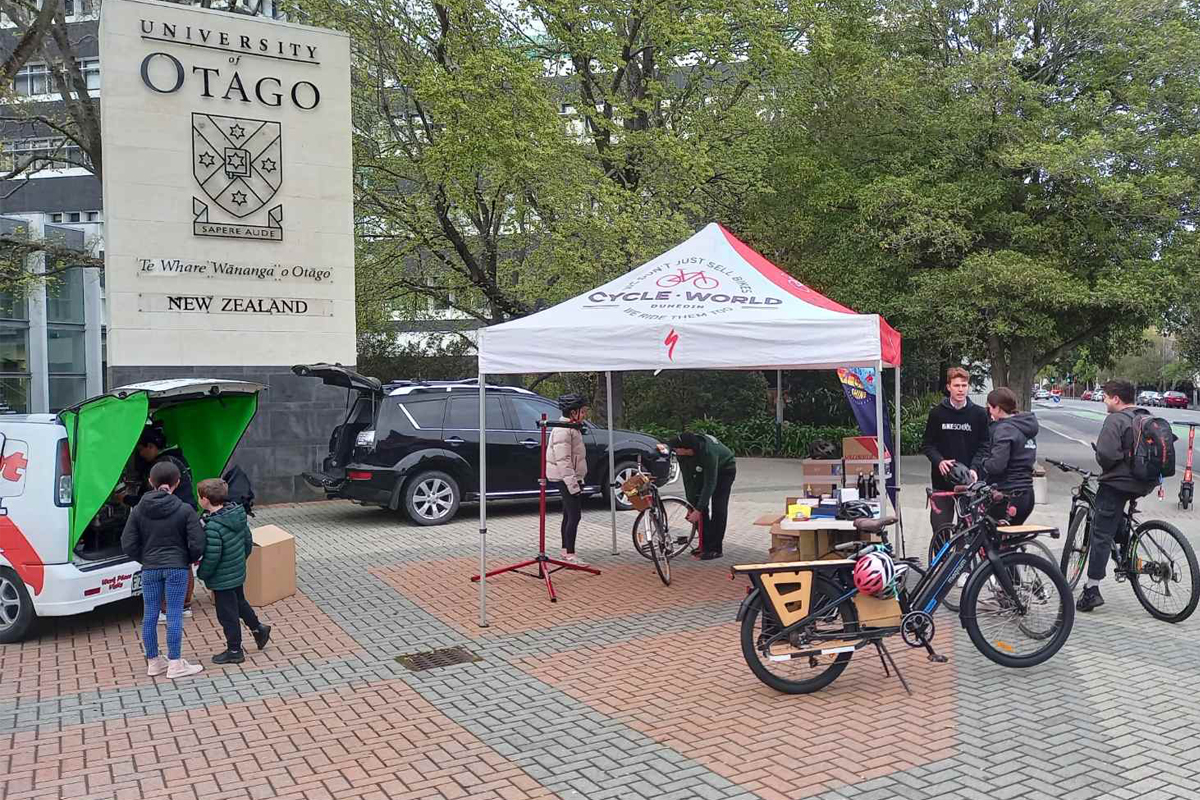
Environmental and social benefits
This programme will reduce our University’s annual greenhouse gas emissions from 48,000tCO2-e to 21,000tCO2-e over a 10-year period then offset hard-to-abate emissions. However, the bigger environmental impact will come beyond our reporting boundary. This includes the work we are doing around food emissions (our third largest emissions source because our residential colleges feed about 2,500 students three meals a day. This has been informed by research conducted by staff and students. The work includes training catering staff on the relationship between menu planning and emissions, sharing that knowledge with students through the menu choices. This awareness-raising aims to create climate conscious consumers and equip students with skills to make and eat their own healthy, delicious, low carbon meals. Our impact is also boosted by working with our food suppliers to source low emissions ingredients and sharing our knowledge of food emissions calculations and lessons learned from living lab research with other organisations that purchase a lot of food (e.g. Corrections, hospitals).
Focussing just on actions in our University’s reporting scope for emissions, our emphasis on wellbeing and equity through our programme principles ensures we don’t just have our “carbon blinkers” on but seek to maximise social and wider environmental outcomes as well. A good example is our workplace travel planning mahi (work), which acknowledges not everyone can take public transport, use active modes, or afford an electric vehicle, because of permanent or temporary disability, family commitments (which still tend to impact female staff and students more) or socio-economic factors. This has led us to focus firstly on reviewing our parking policy and seeking to ensure car park use increases by introducing a parking management app, rather than the status quo of permanently allocating carparks to staff. While increasing use may seem counter-intuitive for a programme that seeks to reduce the number of staff driving to work to reduce commuting emissions, we acknowledged inequity in our carpark allocation model needed to be addressed and that providing staff with an incentive not to use their allocated park and to offer it to others could unlock other modes of travel for them (i.e. no sunk cost of cycling on a day someone else parks in your allocated spot). Evidence from the end of trip living lab will inform our next steps, reflecting our wayfinding approach to decarbonisation.
In terms of the sector, we are an active member of Universities New Zealand and the Sustainable Tertiary Education New Zealand (STENZ) group that meets monthly. Through these channels we share our challenges and lessons and enable the sector to go further, faster, together.
Leadership and engagement
Otago’s net carbon zero programme is tailored to the values and strengths of a research-based University in Aotearoa New Zealand. Through our embrace of connections with teaching, learning, research, and local, national, and international partners, we are helping to multiply the impact of our decarbonisation efforts.
Significance to the sector
Otago’s comprehensive scope boundary for emissions, encompassing student travel and food emissions, sets us apart from many other tertiary providers. We firmly believe if you don’t measure it, you can’t manage it. While we have limited control over some of these scope three/category 3&4 emissions, we do have some influence, particularly when we collaborate with partners such as territorial authorities. Through our transparency, we hope to demonstrate leadership to others.
Our approach to offsetting – namely seeking to use ‘insetting’ via research-led native forest regeneration projects, at the scale of 1,000s of hectares, also sets us apart. This is driven from our programme principles, as discussed above.
Wider societal impact
Wider societal impact is being achieved through:
- Connecting decarbonisation to teaching, learning, and research activities at our University. For example: using a living lab approach to issues – such as increasing use of public transport (employing 6 x summer students in collaboration with the Otago Regional Council, Dunedin City Council, the University’s Transport Research Network and this programme), and the best option for replacing our University’s largest LPG boiler – provides authentic learning contexts for students and experiences that set them up for either a career in the workforce or research. For more on our summer student programme, see our Green Gown Awards 2023 award entry for Pūhau ana te rā. The programme also works with existing courses as diverse as energy management, social work, sustainable business, marketing, geography, IT, and data science to provide and support group projects or deliver guest lectures (for a list of climate change related courses, see here). This ensures our graduates leave Otago with a better understanding of climate change and how to tackle it.
- Connections with other organisations (councils, government organisations) – as described above – which, for example, can support hospitals and prisons to lower the carbon footprint of their food services.
- Leadership – we seek to demonstrate to others how decarbonisation can be achieved in line with our values and principles, and to share these messages. For example, our approach to placing a ceiling on air travel emissions below half of pre-pandemic levels has been useful for other organisations to speak with their leadership teams about the level of ambition they should be exhibiting in their programmes.
In addition, to enact our principles of whanaungatanga (participation, belonging, and connection) and kotahitanga (cohesion and collaboration), we put an equity lens over everything we do to ensure we don’t create negative societal impacts in our pursuit of decarbonisation or carbon offsets. See the discussion of workplace travel planning and carbon ‘insetting’ above for examples.
Learner/Graduate employer impact
As noted above, the programme provides Otago students with a range of opportunities to engage including working on living lab projects such how best to replace an LPG boiler, doing programme-related coursework, or hearing about key concepts at lectures and events.
One challenge we have identified in the sustainability field is the lack of strong career pathways for early career professionals. For this reason, the programme created a 0.5FTE project support officer role designed for students near the end of their study or recent graduates so they can get experience with preparing greenhouse gas inventories, emissions reduction planning, project delivery, and stakeholder engagement. This role is currently filled (very ably!) by a graduate from our Masters of Sustainable Business.
Similarly, through our Pūhau ana te rā summer scholarship programme, we are helping to increase the cohort of graduates with hands-on experience in sustainability issues, underpinned by a strong academic/research understanding.
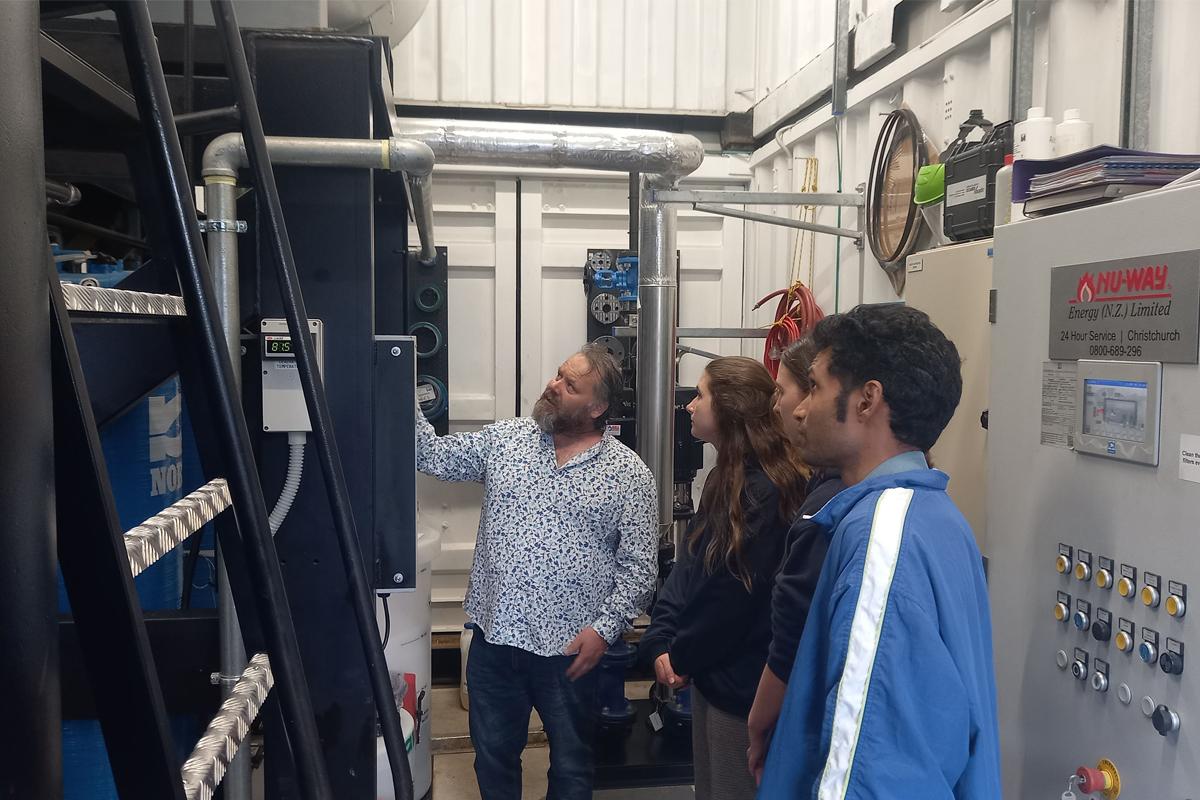
Top 3 learnings
Related finalists
Climate Action/Winners
Climate Action/Winners
Climate Action
Climate Action
Other finalists
Climate Action
Climate Action
Sustainability Champion – Staff/Winners
Sustainability Champion – Staff/Winners
Student Engagement
Student Engagement
Creating Impact
Creating Impact
Sustainability Champion – Staff/Winners
Sustainability Champion – Staff/Winners
Sustainability Champion – Student
Sustainability Champion – Student
Top 3 learnings
Climate Action category
The University of Otago is committed to living up to its role as a critic and conscience of society by both addressing its own carbon footprint and working with others to support the transition to low emissions economies that are sustainable for the planet and its communities. This work is being driven through our University’s Net Carbon Zero Programme, which was established following a commitment in 2019 to reach net zero greenhouse gas emissions by 2030.
A dedicated programme manager began in early 2021 and by the end of that year, the first iteration of a programme business case had been endorsed by senior leadership and the University of Otago Council. The business case sets out the target operating model in 2030, emissions reduction targets for every emissions source annually through to 2032, and a staged approach to meet these targets. The overarching goal is for total emissions to reduce by 54% from 2019 to 2029, with 2029’s emissions offset in 2030 to achieve net zero.
In early 2022, the University publicly released our ‘Journey to 2030′, a document which set out the University’s past, present and intended future with respect to emissions. Rather than employ the standard metaphor of a ‘roadmap’, we drew inspiration from Polynesian explorers and contemporary indigenous academics’ focus on the wayfinding method of leadership and are employing a wayfinding approach (Spiller, Barclay-Kerr, & Panoho, 2015). This acknowledges that, while reaching net zero is our primary goal, we cannot predict with certainty what the future may look like, or what challenges we will face along the way, and we must not lose sight of the many purposes of this voyage. The steps we have taken to date have established the foundation to pursue net zero in a fashion befitting a research-led university in Aotearoa New Zealand.
The principles for our pursuit of net zero emerged from work to refresh the University’s Sustainability Strategic Framework (see: Tī Kouka: Sustainability Strategic Framework 2022-2030). Our net zero principles centre on orangatanga (the health and wellbeing of ecosystems and society) as this is where corrective action is required. How and what we’ll do is guided by the principles of kaitiakitanga (reciprocal stewardship), manaakitanga (looking after and giving back), whanaungatanga (participation, belonging and connection) and kotahitanga (cohesion and collaboration). Around all of this we wrap mātauranga (creation and sharing of knowledge and understanding), which acknowledges the unique position of a university to positively influence activities beyond its operational boundaries.
A key tenet of the programme is that emissions reductions reach across all aspects of our University operations, all staff will have roles to play, and many projects that reduce emissions will be funded from existing baselines, such as efforts to reduce building footprints and save energy. However, in some instances, departmental budgets may prove insufficient to purchase the lower emissions option, such as for replacement vehicles. For this reason, a separate $5.5m decarbonisation fund was established within the University’s long-term capital plan. To date, this fund, which is administered by the Net Carbon Zero Programme, has helped ensure the purchase of low emissions vehicles for Trades Services and Schools Liaison teams, energy-efficient freezers for Microbiology, and brought forward replacing fossil fuel boilers. Funding top-ups are followed by work to review standards and purchasing approaches, so the low emissions option becomes the default, bulk purchasing options are explored, and financial budgets are set accordingly (so top-ups are no longer required).
Having agreed emissions targets in place and our ‘Journey to 2030’ published by early 2022 enabled our University to bank some of the emissions reductions realised as a result of COVID-19. Pre-pandemic, business air travel was our largest emissions source (c.12,000tCO2-e). This reduced by 86% with the advent of pandemic-related travel restrictions. Our target for 2022 and beyond was that these emissions would not go back above 5,500tCO2-e (46% of 2019). This means that as we emerged from travel restrictions we could communicate to staff what the new normal needs to look like, and update policies that stood in the way of more online attendance or trip-stacking to reduce total flights. Business air travel emissions in 2022 were 4,300tCO2-e, well below the new ceiling and we forecast staying below this ceiling in 2023 with no external, nationwide travel restrictions. Our current focus is on supporting heads of department with better reporting to manage for emissions as well as financial cost, and to ensure equity and high impact through the distribution of travel.
The programme principles described above are reflected in our embrace of the living lab approach. Wherever possible, we try to connect teaching, research and external/community partnerships to solve operational issues and reduce our net emissions. Examples of net zero-related living lab projects include:
- Collaborations with the Otago Energy Research Centre and the Physics Department to support student projects investigating options to replace LPG boilers, increase energy efficiency at University-owned flats and right-size solar and battery storage installs for resilience, load-shedding, and decarbonisation outcomes
- End-of-trip living lab, which is testing the use of an app for carpark management, improved EV charging facilities and e-bike storage, and an end-of-trip neighbourhood model, while working with staff and students in disciplines such as Surveying to assess the outcomes – with a view to applying lessons learnt to support low emissions commuting to and from all of our campuses
- Native forest regeneration summer scholarship projects undertaken by nine botany students over the last two years looking at soil carbon, viability of drone seeding, and mapping and age assessments of naturally regenerating vegetation to inform potential University carbon ‘insetting’ projects.
Connecting our mahi (work) with our partners is also an important part of enacting our principles. We work closely with the Otago University Students Association on initiatives such as Drop For Good (reducing waste generated by the student community) and, based on feedback from students, we are collaborating on a project that hopes to reintroduce passenger rail between Christchurch and Dunedin to provide more sustainable travel options for students at peak travel times in the year.
We are also a foundational member of the Dunedin Zero Carbon Alliance – New Zealand’s first city-based Zero Carbon Alliance – alongside the Dunedin City Council and Otago Regional Council, Te Whatu Ora Southern (district health board) and Otago Polytechnic. As major employers in Dunedin with specialist knowledge, we have a key role to play in helping the city achieve its net zero 2030 target. Three members of the alliance (us, the Dunedin City Council, and Te Whatu Ora) co-fund a workplace travel plan coordinator who works across the three organisations to promote active and public transport to reduce commuting emissions, alongside other objectives such as enhancing and supporting the wellbeing of our people (see the University’s Workplace Travel Plan for more details).
Our University is also an active participant in the Carbon Neutral Government Programme (CNGP) and has presented at online seminars on topics such as emissions reduction planning and workplace travel planning. Through the CNGP network, we have connected with organisations such as Corrections (sharing lessons from calculating food emissions), Inland Revenue (employee travel surveys and connecting Dunedin office staff to Zero Carbon Alliance mahi) and Crown Research Institutes (lab-based emission reduction). The University also engages with its partners in the Matariki Network of universities globally, co-organising the first online ‘climate hui’ held in April 2023.
Finally, our University is not only focused on climate change mitigation but acknowledges that climate change adaptation is also needed. Though the University is not currently required to report on climate-related risk, we did an assessment in 2022 and an interim report on financial risks out to the year 2100 (encompassing physical and transitionary risks) has been provided to the University of Otago Council in 2023. These are the first steps towards fully understanding, disclosing and planning for climate-related risks across all our operations.
Spiller, C., Barclay-Kerr, H., & Panoho, J. (2015). Wayfinding leadership : ground-breaking wisdom for developing leaders. Wellington Aotearoa New Zealand: Huia.

Environmental and social benefits
This programme will reduce our University’s annual greenhouse gas emissions from 48,000tCO2-e to 21,000tCO2-e over a 10-year period then offset hard-to-abate emissions. However, the bigger environmental impact will come beyond our reporting boundary. This includes the work we are doing around food emissions (our third largest emissions source because our residential colleges feed about 2,500 students three meals a day. This has been informed by research conducted by staff and students. The work includes training catering staff on the relationship between menu planning and emissions, sharing that knowledge with students through the menu choices. This awareness-raising aims to create climate conscious consumers and equip students with skills to make and eat their own healthy, delicious, low carbon meals. Our impact is also boosted by working with our food suppliers to source low emissions ingredients and sharing our knowledge of food emissions calculations and lessons learned from living lab research with other organisations that purchase a lot of food (e.g. Corrections, hospitals).
Focussing just on actions in our University’s reporting scope for emissions, our emphasis on wellbeing and equity through our programme principles ensures we don’t just have our “carbon blinkers” on but seek to maximise social and wider environmental outcomes as well. A good example is our workplace travel planning mahi (work), which acknowledges not everyone can take public transport, use active modes, or afford an electric vehicle, because of permanent or temporary disability, family commitments (which still tend to impact female staff and students more) or socio-economic factors. This has led us to focus firstly on reviewing our parking policy and seeking to ensure car park use increases by introducing a parking management app, rather than the status quo of permanently allocating carparks to staff. While increasing use may seem counter-intuitive for a programme that seeks to reduce the number of staff driving to work to reduce commuting emissions, we acknowledged inequity in our carpark allocation model needed to be addressed and that providing staff with an incentive not to use their allocated park and to offer it to others could unlock other modes of travel for them (i.e. no sunk cost of cycling on a day someone else parks in your allocated spot). Evidence from the end of trip living lab will inform our next steps, reflecting our wayfinding approach to decarbonisation.
In terms of the sector, we are an active member of Universities New Zealand and the Sustainable Tertiary Education New Zealand (STENZ) group that meets monthly. Through these channels we share our challenges and lessons and enable the sector to go further, faster, together.
Leadership and engagement
Otago’s net carbon zero programme is tailored to the values and strengths of a research-based University in Aotearoa New Zealand. Through our embrace of connections with teaching, learning, research, and local, national, and international partners, we are helping to multiply the impact of our decarbonisation efforts.
Significance to the sector
Otago’s comprehensive scope boundary for emissions, encompassing student travel and food emissions, sets us apart from many other tertiary providers. We firmly believe if you don’t measure it, you can’t manage it. While we have limited control over some of these scope three/category 3&4 emissions, we do have some influence, particularly when we collaborate with partners such as territorial authorities. Through our transparency, we hope to demonstrate leadership to others.
Our approach to offsetting – namely seeking to use ‘insetting’ via research-led native forest regeneration projects, at the scale of 1,000s of hectares, also sets us apart. This is driven from our programme principles, as discussed above.
Wider societal impact
Wider societal impact is being achieved through:
- Connecting decarbonisation to teaching, learning, and research activities at our University. For example: using a living lab approach to issues – such as increasing use of public transport (employing 6 x summer students in collaboration with the Otago Regional Council, Dunedin City Council, the University’s Transport Research Network and this programme), and the best option for replacing our University’s largest LPG boiler – provides authentic learning contexts for students and experiences that set them up for either a career in the workforce or research. For more on our summer student programme, see our Green Gown Awards 2023 award entry for Pūhau ana te rā. The programme also works with existing courses as diverse as energy management, social work, sustainable business, marketing, geography, IT, and data science to provide and support group projects or deliver guest lectures (for a list of climate change related courses, see here). This ensures our graduates leave Otago with a better understanding of climate change and how to tackle it.
- Connections with other organisations (councils, government organisations) – as described above – which, for example, can support hospitals and prisons to lower the carbon footprint of their food services.
- Leadership – we seek to demonstrate to others how decarbonisation can be achieved in line with our values and principles, and to share these messages. For example, our approach to placing a ceiling on air travel emissions below half of pre-pandemic levels has been useful for other organisations to speak with their leadership teams about the level of ambition they should be exhibiting in their programmes.
In addition, to enact our principles of whanaungatanga (participation, belonging, and connection) and kotahitanga (cohesion and collaboration), we put an equity lens over everything we do to ensure we don’t create negative societal impacts in our pursuit of decarbonisation or carbon offsets. See the discussion of workplace travel planning and carbon ‘insetting’ above for examples.
Learner/Graduate employer impact
As noted above, the programme provides Otago students with a range of opportunities to engage including working on living lab projects such how best to replace an LPG boiler, doing programme-related coursework, or hearing about key concepts at lectures and events.
One challenge we have identified in the sustainability field is the lack of strong career pathways for early career professionals. For this reason, the programme created a 0.5FTE project support officer role designed for students near the end of their study or recent graduates so they can get experience with preparing greenhouse gas inventories, emissions reduction planning, project delivery, and stakeholder engagement. This role is currently filled (very ably!) by a graduate from our Masters of Sustainable Business.
Similarly, through our Pūhau ana te rā summer scholarship programme, we are helping to increase the cohort of graduates with hands-on experience in sustainability issues, underpinned by a strong academic/research understanding.

Related finalists
Climate Action/Winners
Climate Action/Winners
Climate Action
Climate Action
Other finalists
Climate Action


Driving Towards Tomorrow’s Campus with Vehicle-to-Grid EV Technology
As part of Flinders University’s drive to innovate and become a leader in climate action, the University launched its Vehicle-to-Grid (V2G) initiative. This involved installing and maintaining 20x V2G and smart chargers for its growing electric vehicle fleet. Leveraging 100% renewable energy generated by ENGIE’s Willogoleche Wind Farm and Flinders University’s solar power systems, this enables the storage of renewable energy in EV batteries to be discharged on campus during peak demand periods. Hence, allows for these EV fleets to operate as a Virtual Power Plant (VPP) to deliver peak demand management and optimization of behind-the-meter generation.
Overall, this initiative demonstrates the reliability and scalability of bi-directional and uni-directional smart-charging systems for EVs in reducing GHG emissions while facilitating teaching, research, and innovation opportunities. Moreover, it exemplifies a sustainable and innovative solution to scale energy storage technology and increase renewables.
Sustainability Champion – Staff/Winners

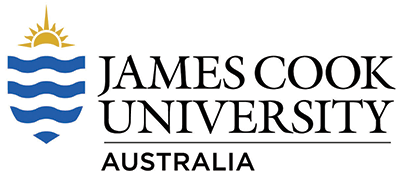
Brandan Espe
Environmental Officer / Acting Grounds Supervisor
Brandan has brought over 50 federally listed Endangered species of plant into the James Cook University living collection, many of which have never been cultivated and are found in no other collection in the world.
Of these, over half have been sustainably wild collected, inclusive of field and clone data, so they can be used for ongoing conservation, research and teaching, the remaining being sourced from private and partner organisations through favours of service or trades.
He personally funded the project from 2019-2022, until funding was awarded for the program due to its success, with the program now being engrained into the Universities landscapes for ongoing management should he leave JCU, creating a threatened species legacy collection.
The program has now expanded beyond this, with an additional 48 species now funded for further addition, some of which are only known from less than 5 sightings in history.
Student Engagement


Sustainability Leaders creating real impact!
La Trobe created a unique Sustainability Leaders volunteering program to increase engagement with students on campus and empower them to act against waste and promote sustainability. It included the following initiatives:
- Promoting the reusable crockery implementation,
- Increasing knowledge action of other students on campus to diversion comingled recycling and organic waste from landfill.
- Focus on waste audits and data,
- Improved signage through new waste posters for students living on campus.
- Collaboration with Cirka (our cleaning and waste partner) to create a waste wall and;
- Learning all things sustainability (net zero, biodiversity, waste, reusables, engagement)
These initiatives yielded significant results and with a reduction in waste contamination by almost 40% at the residential buildings and engagement with over 80 groups of people for the Reusable Revolution.
Creating Impact


Where knowledge meets habits: Empowering students for a sustainable tomorrow
Our online Sustainability Challenges offer participants an engaging, self-paced learning experience centered around a specific United Nations Sustainable Development Goal (UNSDG). Requiring minimal resourcing and at zero-cost to participants, we’ve created replicable, compact, scalable, and impactful learning opportunities that result in real impact.
The Challenges follow a structured process that moves participants from knowledge gain to simple action to celebration, to establish small but mighty habits relating to waste and carbon emissions. This approach recognises that knowledge alone is often insufficient to drive behaviour change, and that ease of action and celebration are crucial components in creating sustainable habits.
Sustainability Champion – Staff/Winners


Catherine (CeeJay) Donovan
Veterinary nurse – Anaesthesia
From establishing the Massey Vet School Green Team to leading impactful initiatives, my commitment to environmental sustainability has been making waves. With the help of my team, I have accomplished numerous small, yet meaningful actions, including integrating a sustainability lecture for final year vet students and implementing battery recycling alongside rechargeable battery use. Our larger projects encompass the introduction of green waste and soft plastics recycling bins, an energy audit resulting in power-saving measures, and playing a part in a successful rubbish audit. I spearheaded the ‘6 in 6’ campaign, empowering individuals with six simple steps for workplace sustainability. Through the SustainaVet social media pages I help to educate and inspire peers nationwide. As the Massey School of Veterinary Science sustainability champion, I had the privilege of speaking at the annual veterinary conference on sustainability in clinical practice. Currently I’m conducting pioneering research on responsible cat waste disposal. Together, we’re forging a greener future, one initiative at a time.
Sustainability Champion – Student


Louis Walmsley
SDG Coordinator Monash Association of Sustainability, Office Bearer Monash Student Association’s Environmental and Social Justice Department, Masters of Environment and Sustainability Student
Louis is an exceptional student sustainability leader at Monash University. His passion and dedication to sustainability have made a significant impact on the community. Louis’s values revolve around sustainability, which is evident upon meeting him. He actively participates in various sustainability groups, demonstrating his commitment to creating a more environmentally conscious society.
One of Louis’s notable involvements is with Precious Plastic Monash, where he organizes remarkable events and fosters collaboration among like-minded individuals, student groups, and staff. His contributions to the Monash Association of Sustainability have allowed him to conduct valuable research on plastic usage and climate action, resulting in positive changes within the university.
Through his work with the Monash Student Association, Louis has engaged hundreds of students in fun and interactive sustainability initiatives. He took the initiative to organize a sustainability food fair, which was one of the largest sustainability-related events held at Monash post-COVID. This accomplishment is a true testament to Louis’s hard work and creativity.
Louis is an outstanding student leader whose efforts in sustainability have had a lasting impact on Monash University and its community. His inspiring nature resonates with everyone who knows him.

